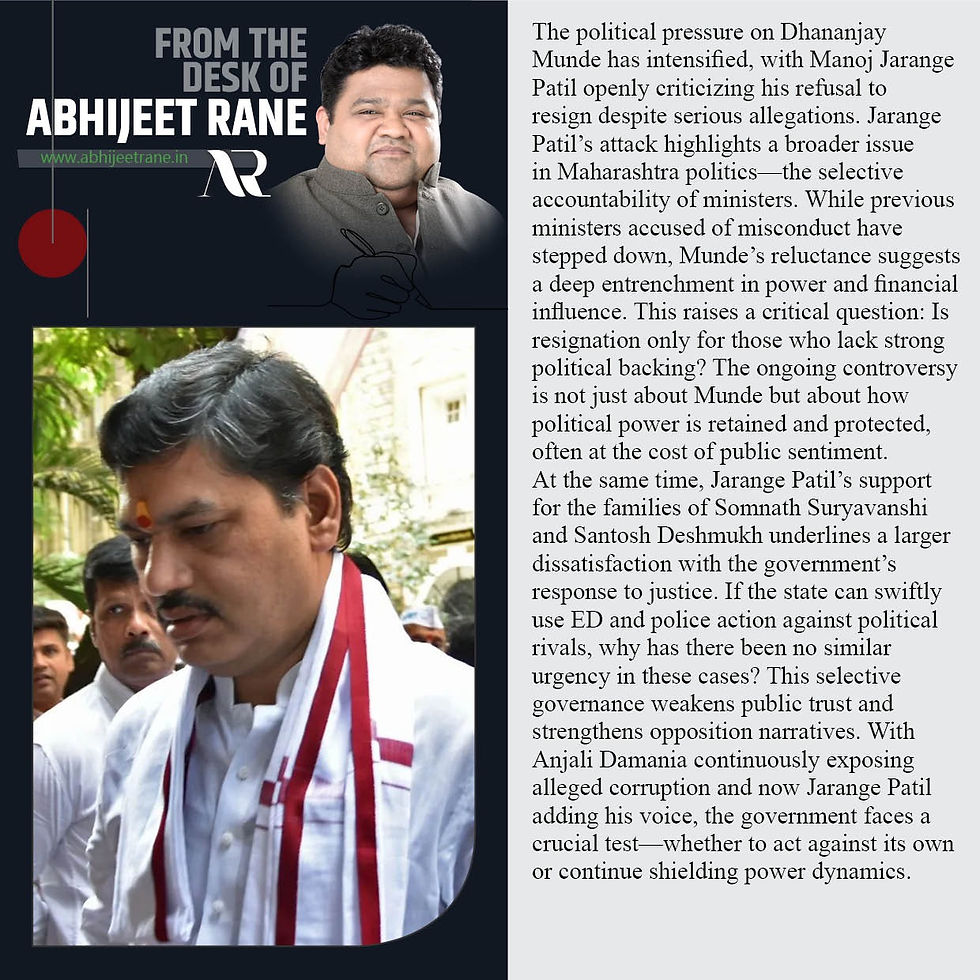From the desk of Abhijeet Rane:
- dhadakkamgarunion0
- Feb 23
- 4 min read
From the desk of Abhijeet Rane:
The appointment of Rekha Gupta as Delhi’s Chief Minister marks a significant political shift in the capital, signaling the BJP’s continued expansion and consolidation in the region. As a first-time MLA, Gupta's rapid rise reflects the party’s strategy of promoting grassroots leaders with strong organizational backgrounds. Her extensive political journey, from ABVP to BJP’s national executive, suggests that she will focus on youth engagement, women’s empowerment, and governance rooted in ideological discipline. The retention of key departments like finance, revenue, and women & child development indicates that she will be directly involved in policy-making, ensuring strong administrative control while prioritizing BJP’s core voter base.However, given Delhi’s complex political dynamics and the presence of the AAP-led MCD and opposition parties, Gupta’s government will have to navigate governance challenges while maintaining BJP’s larger national narrative. Her tenure will be a crucial test of how effectively the BJP can balance local governance issues with national political aspirations in the capital.
From the desk of Abhijeet Rane:
The political pressure on Dhananjay Munde has intensified, with Manoj Jarange Patil openly criticizing his refusal to resign despite serious allegations. Jarange Patil’s attack highlights a broader issue in Maharashtra politics—the selective accountability of ministers. While previous ministers accused of misconduct have stepped down, Munde’s reluctance suggests a deep entrenchment in power and financial influence. This raises a critical question: Is resignation only for those who lack strong political backing? The ongoing controversy is not just about Munde but about how political power is retained and protected, often at the cost of public sentiment.
At the same time, Jarange Patil’s support for the families of Somnath Suryavanshi and Santosh Deshmukh underlines a larger dissatisfaction with the government’s response to justice. If the state can swiftly use ED and police action against political rivals, why has there been no similar urgency in these cases? This selective governance weakens public trust and strengthens opposition narratives. With Anjali Damania continuously exposing alleged corruption and now Jarange Patil adding his voice, the government faces a crucial test—whether to act against its own or continue shielding power dynamics.
From the desk of Abhijeet Rane:
Sanjay Raut’s attack on Eknath Shinde goes beyond a personal rivalry—it reflects Shiv Sena (UBT)’s frustration over the shifting political landscape. His statement that Shinde has built his strongholds with money, not ideology, is an attempt to delegitimize the Deputy Chief Minister’s influence. By comparing Shinde to towering historical leaders like Tilak, Patel, Vajpayee, and Deendayal Upadhyay, Raut questions whether Shinde has truly earned his position or simply benefited from political manipulation. The reference to Amit Shah’s support being the foundation of Shinde’s power is a clear signal that Shiv Sena (UBT) still sees BJP as the mastermind behind Maharashtra’s political shakeup.
At the same time, Raut’s criticism of the Mahadji Shinde award controversy indicates a broader concern about political narratives being shaped to favor the ruling faction. The mention of Sharad Pawar’s involvement in a private award function, mistaken as an official literary event, suggests an attempt to create friction between NCP and Shiv Sena (UBT). While Raut claims this is not a direct conflict with Pawar, his remarks highlight the undercurrent of mistrust within Maharashtra’s opposition space.
From the desk of Abhijeet Rane:
The shocking revelation of women’s private videos being recorded and sold at the Maha Kumbh Mela 2025 exposes a disturbing reality of digital crime and privacy violations in India. What should be a sacred and spiritual gathering has become a hunting ground for exploiters, taking advantage of technological loopholes and the anonymity of social media. The fact that such videos are being monetized and circulated on platforms like Telegram and Instagram shows how deep-rooted the issue of online exploitation has become. While authorities have taken swift action by identifying over 100 accounts and filing FIRs, the real challenge lies in preventing such incidents before they occur. Surveillance mechanisms need to be strengthened, and tech platforms must be held accountable for allowing such content to spread.Maha Kumbh is a religious event where devotees seek purity and spiritual connection, yet some individuals are using it for predatory and exploitative purposes. The fear and trauma caused to the victims is immeasurable, and stricter cyber laws along with public awareness campaigns are essential to combat such digital crimes.
From the desk of Abhijeet Rane:
Chief Minister Devendra Fadnavis statement about building a bigger memorial for Chhatrapati Shivaji Maharaj in Agra is nothing but a political stunt to grab attention and shift focus away from the real issue—the incomplete Arabian Sea Memorial in Maharashtra. Chhatrapati Shivaji Maharaj belongs to Maharashtra, and his grand memorial should be completed in his own land before leaders start making tall claims about glorifying him in another state. The Arabian Sea memorial has been stuck in delays, cost escalations, and political blame games, yet instead of ensuring its completion, the focus is being diverted towards growing tourism in Uttar Pradesh using Chhatrapati Shivaji Maharaj’s name. This is nothing but an insult to Maharashtra and its people, who have been waiting for the grand monument in their own state.Rather than making populist announcements to impress people in Agra, the leadership should first fulfil their promises to Maharashtra and ensure the Arabian Sea memorial is completed with full grandeur. Maharashtra’s heritage, its pride, and its tourism should not be sacrificed for political gains elsewhere. If the government is truly committed to honouring Chhatrapati Shivaji Maharaj, then let them prove it by finishing what was promised instead of using his name as a tool for propaganda in another state. Maharashtra’s tourism, forts, and historical sites are far more important than another unnecessary political gimmick to boost tourism in Uttar Pradesh.











Comments